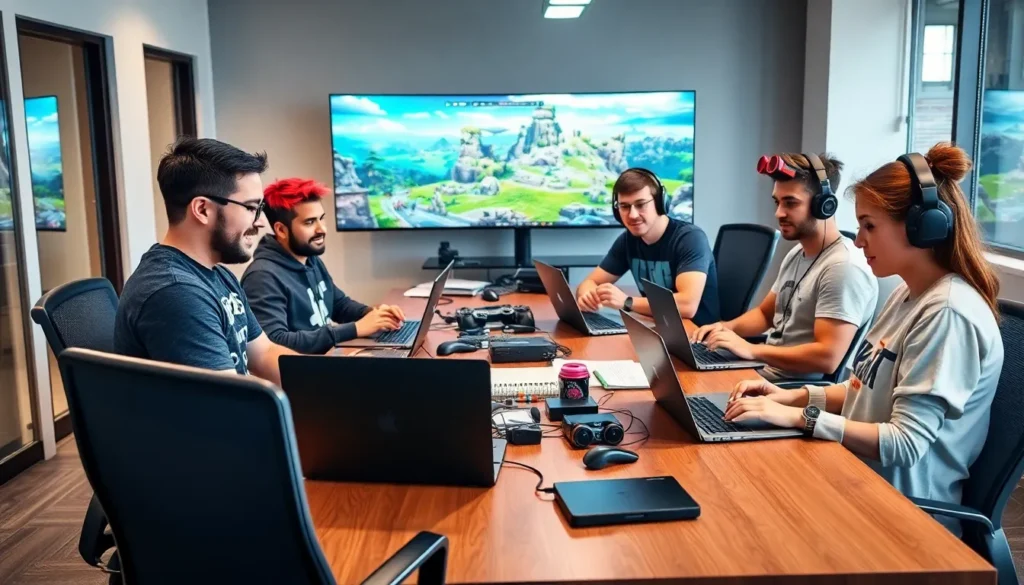Table of Contents
ToggleWhen one thinks of PC gaming, the image that often comes to mind is that of a lone gamer, headset on, deeply engrossed in an expansive world. But there is so much more to the realm of PC gaming, an ever-evolving landscape that reflects changes in technology, creativity, and culture. This article dives into the history of PC gaming, the rise of indie titles, the vibrant community around it, and what the future might hold. Join us as we explore these dimensions of a passionate and dynamic hobby.
The Evolution Of PC Gaming

The journey of PC gaming is rich with innovation and transformation. From the rudimentary text-based adventures to the photorealistic worlds we navigate today, the evolution of this medium is remarkable.
Key Milestones Over The Decades
PC gaming began in the late 1970s with games like “Adventure” and “Zork,” which captivated players with their storytelling potential and allowed them to use their imaginations. The 1980s introduced graphical user interfaces with classics like “King’s Quest” and groundbreaking technologies such as the Commodore 64 and early IBM PCs.
The 1990s marked the dawn of multiplayer gaming and online competitions. Titles like “Doom” and “Quake” not only defined first-person shooters but also laid the groundwork for online communities. As the 2000s rolled in, advancements in hardware allowed for more complex graphics and gameplay mechanics. High-speed internet connectivity opened the door to streaming and large-scale online interactions, ushering in an era dominated by MMO (Massively Multiplayer Online) games like “World of Warcraft.”
Impact Of Technology Advancements
Technological advancements have played a pivotal role in shaping PC gaming. The rise of powerful GPUs (Graphics Processing Units), faster processors, and expansive storage capacity has enabled developers to create immersive experiences. Besides, innovations like cloud gaming are minimizing the barriers to entry, allowing gamers to experience high-quality titles without very costly on hardware. As technology progresses, so do the possibilities in programming new worlds and narratives, bringing us ever closer to the potential of creating virtual realities indistinguishable from real life.
The Rise Of Indie Games
Indie games have carved out a unique space in the PC gaming ecosystem, gaining tremendous popularity and respect over recent years.
How Indie Games Reshape The Landscape
Indie developers often work with smaller teams, utilizing their creativity and passion to produce games that might otherwise be overlooked by major studios. This has led to a proliferation of unique gameplay styles, storytelling techniques, and aesthetic approaches. Titles such as “Celeste,” “Hollow Knight,” and “Stardew Valley” showcase how indie games can evoke emotional responses and engage players without requiring blockbuster budgets or marketing campaigns.
The success of these indie titles is reshaping conversations around what makes a game successful. They emphasize storytelling, character development, and community engagement, often encouraging discussions that transcend gaming itself.
Notable Indie Titles To Explore
For those looking to investigate into the indie scene, several titles have made a substantial impact. “Undertale” presents a narrative that allows players to choose between combat and compassion, leading to multiple endings that challenge traditional gameplay mechanics. Similarly, “Hades” combines thrilling combat with a compelling storyline, developing characters with depth and making every run feel unique. These games reflect the rich creativity thriving within the indie programming sector and have established a loyal following among gamers.
The Community And Culture Of PC Gaming
Beyond the games themselves, the culture surrounding PC gaming has become an essential component of the experience.
Online Communities And Social Interaction
Online communities flourish in PC gaming. Platforms like Discord, Reddit, and Steam have fostered spaces where gamers can connect, share experiences, and collaborate. These virtual hangouts serve not just as forums for strategy discussions but also as social spaces where friendships blossom over shared interests and late-night gaming sessions. Social interaction is a fundamental aspect of the gaming experience: it allows players to come together to tackle hard challenges or exchange tips and tricks.
Gaming Events And Conventions
Gaming events and conventions, such as PAX and E3, gather thousands of players under one roof. These gatherings celebrate gaming culture through panels, discussions, and exclusive previews of upcoming titles. Events like these highlight the communal spirit of gaming and offer opportunities for attendees to meet developers, influencers, and other gamers. The sense of belonging that arises from these experiences can be profound, fostering lifelong connections and memorable moments among attendees.
The Future Of PC Gaming
As the landscape of PC gaming continues to evolve, several trends emerge that promise to shape the future of the medium.
Trends To Watch In The Coming Years
One noteworthy trend is the growing popularity of subscription-based gaming services. Platforms like Xbox Game Pass are revolutionizing how players access titles, offering an expansive library for a monthly fee. This model is likely to give rise to greater experimentation in game design as players feel encouraged to try new experiences without the stigma of commitment.
Another trend is the increasing emphasis on cross-platform play. As gamers seek to connect with friends across different systems, more developers are focusing on creating titles that allow seamless play regardless of the hardware.
The Role Of VR And AR In Gaming
The integration of Virtual Reality (VR) and Augmented Reality (AR) presents exciting possibilities for PC gaming. Immersive VR experiences are starting to become more mainstream, crafting environments where players can physically engage in the game world. Titles such as “Half-Life: Alyx” exemplify how VR can enhance gameplay dynamics, creating a level of engagement previously unthinkable. AR, on the other hand, such as seen in games like “Pokémon GO,” offers unique ways to interact with the environment, blending aspects of the real world with gameplay. As these technologies refine, they will likely reshape narratives and redefine how stories are told in games.
Conclusion
PC gaming stands as a testament to the evolution of technology, creativity, and community. From its humble beginnings to the immersive worlds we can explore today, it reflects broader cultural shifts and societal changes. With the rise of indie games, vibrant online communities, and emerging technologies like VR, the future of PC gaming is as bright as ever. As gamers continue to gather around shared experiences, the potential for innovation remains limitless, driving both creativity and connection in this passionately pursued hobby.




